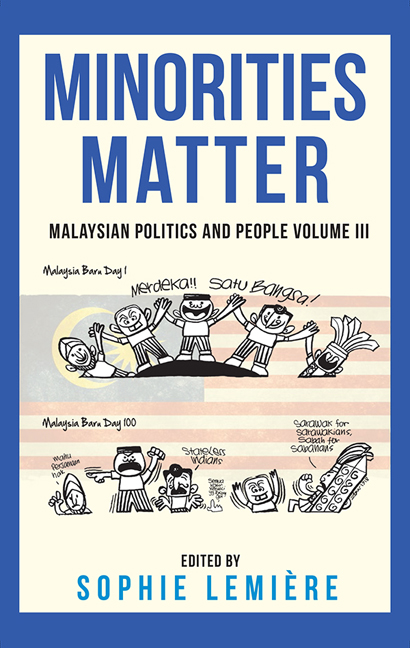Book contents
- Frontmatter
- Contents
- Acknowledgements
- Foreword
- Introduction
- Part I Engaging Politics: The Role of Minorities in GE14 and Beyond
- Part II Building Democracy: Malaysia Baru and the (Im-)possible Reform
- 6 Malaysia – A State of Sanctuary?
- 7 The Image of Laziness and the Malaysian Middle Class: Unpacking the Politics of Indolence
- 8 Poverty, Inequality and Youth Mental Health: Psychological Distress is Political
- 9 Competing Rights Talk and Pakatan Harapan's Incoherent Human Rights Agenda
- 10 The Court of the King of Hearts: The Long Failure of the Malaysian Judiciary – A Legal and Personal Perspective
- List of Contributors
7 - The Image of Laziness and the Malaysian Middle Class: Unpacking the Politics of Indolence
from Part II - Building Democracy: Malaysia Baru and the (Im-)possible Reform
Published online by Cambridge University Press: 25 January 2020
- Frontmatter
- Contents
- Acknowledgements
- Foreword
- Introduction
- Part I Engaging Politics: The Role of Minorities in GE14 and Beyond
- Part II Building Democracy: Malaysia Baru and the (Im-)possible Reform
- 6 Malaysia – A State of Sanctuary?
- 7 The Image of Laziness and the Malaysian Middle Class: Unpacking the Politics of Indolence
- 8 Poverty, Inequality and Youth Mental Health: Psychological Distress is Political
- 9 Competing Rights Talk and Pakatan Harapan's Incoherent Human Rights Agenda
- 10 The Court of the King of Hearts: The Long Failure of the Malaysian Judiciary – A Legal and Personal Perspective
- List of Contributors
Summary
In 1977, Syed Hussein Alatas criticised the function of colonial capitalism in perpetuating the notion that Malays, Filipinos and Javanese populations were inherently lazier than other ethnic groups in their communities. This chapter revisits the ‘myth of the lazy native’ through an examination of the ideological function of this racial stereotype in the context of neoliberal capitalism. I draw from historical sociology and interview data to argue that the lazy Malay stereotype becomes re-appropriated in different historical formations. I carry out in-depth qualitative research interviews with twenty-five Malaysian nationals in the United Kingdom and Malaysia who work in middle-class occupations. I find that significant portions of middle-class Malays believe that the stereotype of laziness has a truthful basis, and argue that this stereotype is selectively applied based on class background. Furthermore, Malaysian middle-class interviewees tend to interpret and conceptualise laziness through the framework of neoliberal rationality, as they assess a person's industriousness through his/her contribution towards the market economy. This chapter aims to contribute towards our understanding of how the middle class plays a unique role in the reproduction of capitalist culture and class relations in Malaysia. It argues that the myth of the lazy Malay has helped to legitimise intra- and inter-ethnic inequality, and establish new notions of ‘deservedness’ and ‘un- deservedness’ within neoliberal capitalism. It is thus argued that the myth of the lazy Malay thus holds important political implications in contemporary Malaysian democracy, particularly for how we tackle issues of wealth inequality and Malay affirmative action.
Introduction: The Politics of the Laziness Stereotype
Where are our faults? There are many. The first is we do not work as hard as others. Not only that, we also do not pay attention to our responsibilities. We don't pay attention before deciding to do something. We lack mastery of the knowledge and information needed to make good decisions. I dare to say that we are lazy. We like to hand over our jobs to other people.
(Mahathir Mohamad, 2018)The return of Mahathir Mohamad to the premiership of Malaysia has been accompanied by a resurgence of public discourse concerning the stereotype of laziness applied to the Malay community, as evidenced by his above remarks during the Parti Pribumi Bersatu Malaysia (Bersatu) party's second annual celebration (Ruzki & Chan, 2018).
- Type
- Chapter
- Information
- Minorities MatterMalaysian Politics and People Volume III, pp. 108 - 123Publisher: ISEAS–Yusof Ishak InstitutePrint publication year: 2019

